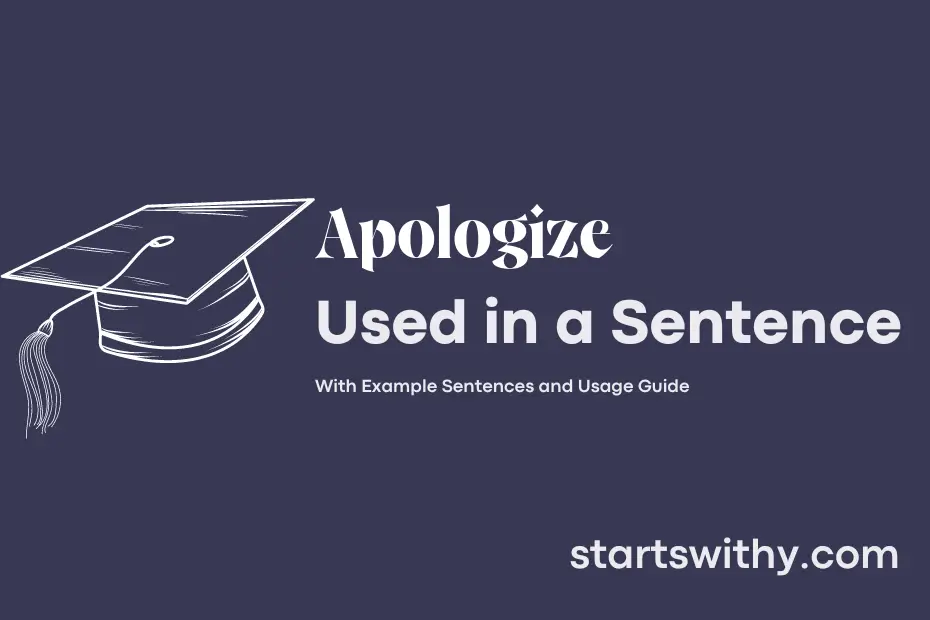Have you ever found yourself in a situation where you needed to admit fault or express regret for a mistake? This is where the act of apologizing comes into play.
To apologize means to acknowledge and express genuine remorse for a wrongdoing or error, whether intentional or unintentional. It involves taking responsibility for one’s actions and seeking to make amends for any harm caused.
7 Examples Of Apologize Used In a Sentence For Kids
- I am sorry.
- Please apologize to your friend.
- It’s important to apologize when you make a mistake.
- Let’s all say sorry for our actions.
- Remember to apologize if you hurt someone’s feelings.
- Saying sorry shows that you care about others.
- Don’t forget to apologize for your behavior.
14 Sentences with Apologize Examples
- Apologize for missing the deadline on the group project.
- Remember to apologize if you accidentally step on someone’s foot in a crowded lecture hall.
- Don’t forget to apologize to your roommate if you accidentally eat their leftovers from the fridge.
- It’s important to apologize if you unintentionally interrupt someone during a class discussion.
- Make sure to apologize if you forget to return a borrowed textbook to a friend.
- You should apologize if you are late for a study group session without giving prior notice.
- Don’t hesitate to apologize if you accidentally spill coffee on someone’s notes.
- Remember to apologize if you accidentally make a loud noise in the library.
- It’s good practice to apologize if you unintentionally hurt someone’s feelings during a debate or discussion.
- Make sure to apologize if you forget to inform your study group about a change in meeting time.
- It’s important to apologize if you forget a friend’s birthday and they feel upset about it.
- Remember to apologize if you accidentally take someone else’s seat in a packed lecture hall.
- Don’t forget to apologize if you accidentally bump into someone while rushing to a class.
- It’s always a good idea to apologize if you accidentally copy someone else’s work without giving credit.
How To Use Apologize in Sentences?
Apologize means to express regret or say sorry for something that you have done wrong or caused an inconvenience to someone.
Here are some tips on how to use apologize in a sentence:
-
Begin your sentence with “I apologize” or “I would like to apologize” followed by the reason for the apology.
- Example: “I apologize for my mistake in missing the deadline.”
-
Use apologize when you want to express regret sincerely and show that you are sorry for your actions.
- Example: “I apologize for any inconvenience I may have caused.”
-
Apologize is commonly followed by the word “for” or “to” depending on the situation.
- Example: “I apologize for my behavior last night.”
-
You can also use apologize when asking for forgiveness or admitting fault.
- Example: “I apologize for my unkind words.”
-
Remember to be genuine and sincere when using apologize to make your apology meaningful and heartfelt.
Practice using apologize in different sentences to become more comfortable with expressing regret and making sincere apologies.
Conclusion
In conclusion, the act of apologizing is a crucial component of effective communication and conflict resolution. By acknowledging and taking responsibility for mistakes, individuals show humility and respect towards others. For example, “I apologize for my insensitive comment” or “I am sorry for the misunderstanding.”
Furthermore, apologies facilitate the restoration of trust and relationships by demonstrating genuine remorse and a willingness to make amends. Utilizing sentences like “I apologize for any inconvenience caused” or “I am sorry for my behavior” can help mend rifts and promote understanding between parties. Ultimately, apologizing is a powerful tool for fostering empathy, reconciliation, and mutual respect in personal and professional interactions.



